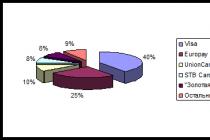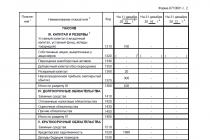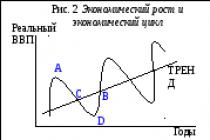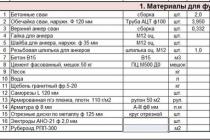The state in the securities market can act as an issuer and investor. As an issuer, it can only issue . The issue of shares at the state level is a priori impossible, because the country is not a joint-stock company and cannot issue securities that provide ownership of it (you cannot buy a share in the state).
By issuing bonds, the state, thus, draws up the state. debt by paying investors interest on it. However, as an investor, the state can acquire securities Russian companies and be the owner of these organizations in proportion to the purchased share.
State shares are the property of the country in relation to Russian companies
There are a number of major issuers in Russia that are flagships Russian economy, and the share of state participation in such companies is sometimes very significant. State shares are acquired for the purpose of control at the federal level, such organizations are also called state. enterprises.
State shares - list of federal property
Below in descending order state share participation, the economic-forming companies of Russia are listed. The state owns the shares federal agency for the management of the state property.
- – 79.55% belongs to the state.
- – 78.1% owned by the government.
- - 75.16% is owned by the Russian Federation.
- - 75.5% property of the Russian Federation.
- - 60.38% refers to the property of the Russian Federation.
- – 57.58% belongs to the Bank of Russia.
- - 51.17% owned by the Russian Federation.
- - 50.002% is owned by the state.
- – the state owns the company through JSC GAZPROM, whose share in it is 10%.
- - the share of the state is 6.86%.
- - the largest private oil company, whose papers are mainly owned by legal entities.
- – the organization is private, management is the owner of 60% of the shares of the company
- - the most closed company, which has not yet disclosed the exact structure of the capital of shareholders, only there is information that more than 90% of the shares belong to other shareholders.
Thus, state shares are securities of the most significant enterprises in the country, and one must always take into account that the share may change. The exact share can be found on the official website of the respective company in the "Shareholder Structure" section.
Slinko Tatyana Petrovna
Article 69 Budget Code RF (further BC RF) investments in the authorized capital of existing or newly created legal entities are one of the forms of budget expenditures.
The investment of budget funds in the authorized capital of legal entities, in fact, is the investment of budget funds in various sectors of the economy. Investment is carried out on the basis of agreements between the Government of the Russian Federation, executive authorities of the constituent entities of the Russian Federation, local government and legal entities in the authorized capital of which such investment is made. The procedure and conditions for the placement of budgetary funds as investments in the authorized capitals (funds) of legal entities are established by Articles 79 and 80 of the RF BC.
In accordance with paragraph 1 of Art. 80 BC RF provision budget investments legal entities that are not state or municipal unitary enterprises, entails the emergence of the right of state or municipal property for an equivalent part of the authorized (share) capital and property of the said legal entities.
This right in the implementation of budget investments, in particular in an open joint-stock company, is confirmed federal law dated December 26, 1995 N 208-FZ "On Joint Stock Companies". The company transfers to the investor its shares in the amount equivalent to the investment made. These securities must certify the property rights of the participant (shareholder) in relation to the company. This is an indispensable condition for the implementation of budget investments by legal entities that are not state or municipal unitary enterprises. This provision is enshrined in the procedure for allocating funds from the federal budget to non-state commercial organizations subject to participation Russian Federation or an increase in the share of the Russian Federation in the authorized capitals of these organizations, which is approved by Decree of the Government of the Russian Federation of June 1, 1998 N 548 (hereinafter, Order).
When making budget investments in an open joint stock company, shares do not become the property of the investor. In this case, the right of state or municipal ownership arises to an equivalent part of the authorized (reserve) capital and property of an open joint-stock company, confirmed by the shares of such a company, in without fail transferred to the investor in an amount equivalent to the investment made.
According to the Procedure, the allocation of funds from the federal budget to non-state commercial organizations included in the Federal Targeted Investment Program as organizations receiving budget funds is carried out designated purpose for construction, technical re-equipment and reconstruction. Such expenses are possible only if they are included in the departmental structure of federal budget expenditures for these purposes, approved by the federal law on federal budget for the respective financial year.
When providing budget investments to legal entities, specially authorized bodies of executive power or local self-government conclude an agreement on the participation of the Russian Federation, a constituent entity of the Russian Federation or municipality owned by the investee.
The subject of such an agreement is the transfer by the joint-stock company of its own shares to federal ownership under market value for the amount of funds provided in the framework of financing expenditures on public capital investments and sent to the society to finance the reconstruction and technical re-equipment individual industries included in the targeted investment program according to the list of construction projects and facilities for federal state needs.
Under the terms of the agreement, the joint-stock company is obliged to submit to the Ministry of Finance of the Russian Federation a report on the progress of work and spending Money received as part of the funding investment program, as well as draw up documents confirming the transfer of ownership to the Russian Federation, a constituent entity of the Russian Federation or a municipality represented by a specially authorized executive body or local government, the right to shares of a company issued, as a rule, additionally as a result of an increase authorized capital society.
Such an agreement should be considered as a contract for the sale of shares of the company, and the funds received by the company from the federal (regional) budget to finance the reconstruction and technical re-equipment of production cannot be considered in the context of Article 6 of the RF BC as targeted budget resources received on a gratuitous and irrevocable basis.
To confirm our point of view, we can cite the Decree of the Federal Antimonopoly Service of the West Siberian District dated September 11, 2006 No. F04-5759 / 2006 (26172-A67-14) in the case A67-14708 / 05. The object of the proceedings was the refusal tax authority in reimbursement of value added tax paid at the expense of funds received by the joint-stock company under an agreement between the Ministry of Finance of the Russian Federation, the Ministry state property RF ( contract signed in 2004) and an open joint stock company.
The court pointed out that the refusal of the tax authority to reimburse the value added tax from the budget is unlawful, since the company, when paying for the fixed asset, complied with all the conditions provided for in Articles 171, 172 of the Tax Code of the Russian Federation, and the funds received by the taxpayer under the share purchase agreement, cannot be considered as targeted budget funds received on a gratuitous and irrevocable basis and do not form a tax deduction.
In this way, business transactions arising from such an agreement should be reflected, on the one hand, as an operation to sell the company's shares and receive payment for them, and, on the other hand, as the use of the money received for the needs of the company, even if they are specifically stipulated as a subject of financing from the budget.
| Funds received from the budget to the current account (special account) | ||
| Cash recognized as payment for shares at market prices, issuer's report approved | ||
| An increase in the authorized capital was registered as a result of additional issue(share issue) at par value | ||
| The difference between market and face value shares | ||
| Use of funds for the intended purpose | ||
| Received property from the supplier at a cost without VAT | ||
| Selected VAT presented for payment by the supplier | ||
| The main facility was put into operation | ||
| VAT presented by the supplier is recognized as a tax deduction | ||
| Depreciation charged on fixed assets |
** entries on account 80 "Authorized capital" in the event of an increase in the authorized capital are made only after the relevant changes are made to the constituent documents, which implies registration of changes in in due course;
*** if initial cost and term beneficial use for accounting and tax accounting coincides, then the amount of depreciation accrued in accounting is recognized as tax expenses in determining taxable income.
Stock - investment instrument companies. When opening a joint-stock company, the founders issue securities that anyone can buy. The money goes to the company, allowing it to develop, and the owners of the shares receive guarantees. Subsequently, they can count on dividends (share of profits) or part of the property if the company closes.
The question is, who guarantees that the shareholder will receive dividends or cash after the liquidation of the company?
The answer is simple: the state. Or rather, its central bank. The fact is that before selling securities (and generally starting activities), the company conducts state registration shares. It is registration that makes shares securities.
Procedure for registration of shares
The procedure and rules for registering securities - shares, bonds - are enshrined in local legislation. In Russia, this is the Federal Law “On the Securities Market”.
The issuer (i.e. a company issuing securities) is required to register the issue of shares within a month after the establishment legal entity. Otherwise, the joint-stock company may be closed.
For this:
- A joint-stock company holds a meeting at which a decision is made on the issue of securities. This decision is fixed in the document.
- The issuer submits documents for registration of the issue of shares with the Central Bank of the Russian Federation.
- Immediately after registration, securities are placed, that is, they are transferred to shareholders.
- The issuer submits documents for registration of the report on the results of the issue. This must be done within 30 days after the end of the issue.
If the Central Bank of the Russian Federation refuses to register the report, the shares are withdrawn. Successful registration of the report means that the issue has passed according to the law, and the shares have value. The results of the issue are published in open sources (press). Each issue of shares is assigned a unique number.
Format and methods of placement of shares
Depending on the organizational and legal form and purposes of the issue, a joint-stock company has the right to place shares by open or closed subscription. With a closed subscription, securities are transferred to a limited circle of persons, with an open subscription - to an unlimited one. It also depends on how you place it.
Risks and taxation
How to start?
A bond is a debt security, according to which the issuer undertakes to return to the investor the amount borrowed from him, as well as to pay interest within a certain period of time. Buying a bond means you are lending money to the issuer. A bond is issued for a limited period during which the issuer pays the bondholder a percentage of the face value.
Types of bonds
Bonds there are interest and discount.
By interest-bearing bonds During the life of the bond, the issuer pays a periodic interest called a coupon. The vast majority of bonds traded on Russian stock exchanges are interest-bearing.
By discount bonds coupons are not paid. These bonds are issued at a discount, i.e. less than the face value of the bond, and they are redeemed at face value. Thus, the income of the bondholder is the discount - the difference between the issue price and the face value.
By type of issuer bonds are state, municipal, corporate.
Corporate bonds are issued by corporations ( industrial groups and institutions).
government bonds issues the Ministry of Finance of the Russian Federation (OFZ) and the ministries of finance of the constituent entities of the Russian Federation (sub-federal bonds).
Bond characteristics
- nominal cost bonds (nominal). Each bond has a par value. The coupon size is determined as a percentage of the face value. Most bonds traded on Russian stock exchanges have a face value of 1,000 rubles.
- Market price . In addition to the face value, each bond has its market price. Unlike face value, the market price is constantly changing depending on the current market conditions. interest rates, supply and demand of bonds on the stock exchange. The market price is determined on the exchange during the trading process. The market price is quoted not in rubles, but as a percentage of the face value of the bond. And it can be both higher (for example, 101.2%) and lower than the nominal value (98.7%). This price is also called the net price of the bond.
- Bond Coupon- this is interest payment by bond. The size and dates of coupon payments are usually known to the investor in advance. The coupon size is determined as a percentage of the face value.
- Depreciation is the payment of debt on bonds through regular payments.
The borrower resorts to depreciation in order not to find a significant amount of money on the maturity date, for example, the face value of bonds.
Bonds are considered a less risky instrument than stocks, but at the same time, there are both external risks that affect the activity of the issuing company, and internal events that affect the price, and therefore the yield of bonds. Bond prices may change depending on macroeconomic events and events affecting the activities of the company - issuer.
Credit risk of bonds is the risk of non-payment or delay in payment of coupons and/or the principal amount of a bond. Depending on the level of risk of a particular issuer rating agencies assign certain reliability ratings to issuers.
Market risk of bonds is the risk of a change in the value of a bond as a result of changes in the value level or volatility of the current market yield.
Taxation- income tax rate individuals residents of the Russian Federation is 13%. Taxation of transactions with securities is regulated by article 214.1 of part 2 Tax Code RF.
Gazprom is the largest joint stock company in Russia. The total number of accounts holding 23,673,512,900 Gazprom shares is over 470,000. The state controls over 50% of the Company's shares.
The structure of the joint stock capital of PJSC Gazprom* Companies controlled by the Russian Federation
Gazprom shares are one of the most liquid instruments of the Russian stock market. The company's shares occupy the largest share in RTS indices and MICEX. Gazprom shares are included in the first (highest) level of listing on Russian stock exchanges CJSC MICEX Stock Exchange and PJSC Saint Petersburg Stock Exchange.
Basic information about PJSC Gazprom sharesThe voting principle General meeting shareholders - "one voting share of the company - one vote", with the exception of cumulative voting in the case provided for by the Federal Law "On Joint Stock Companies".
History of share capital
On May 20, 1993, the Ministry of Finance of the Russian Federation registered, under No. MF73-1p-0204, an issue of shares of RAO Gazprom in the amount of 236,735,129 shares, the nominal value of each of which was 1,000 rubles.
October 21, 1994 Russian fund federal property in accordance with Presidential Decree No. 1705 dated 12/31/1992, based on the results of a specialized voucher auction for the sale of shares of RAO Gazprom, held from 04/25/1994 to 06/30/1994 in 61 regions of the Russian Federation, split the shares of RAO Gazprom. Crushing has been done in the following way: 1 share with a par value of 1,000 rubles was split into 100 shares with a par value of 10 rubles.
August 19, 1998 by the Federal Commission for the Securities Market in accordance with Decree of the Government of the Russian Federation of February 18, 1998 No. 217 “On the Peculiarities of the Circulation of Securities in Connection with Changes in the Face Value of Russian Banknotes and the Price Scale”, Resolution of the Federal Commission for the Securities Market of Russia of April 20. 1998 No. 6 "On the procedure for amending the decision on the issue of securities, prospectuses for the issue of securities, privatization plans and constituent documents related to the change in the face value of Russian banknotes and the scale of prices" and the decision of the Federal Securities Commission of Russia dated 17.08.1998 were introduced and registered amendments to the prospectus for the issue of ordinary registered non-documentary shares (No. MF73-1p-0204 dated May 20, 1993), as a result of which the nominal value of ordinary registered shares amounted to 0.01 rubles.
After that, all ordinary registered non-documentary shares of OAO Gazprom (since July 17, 2015 - PJSC Gazprom) of the first issue (state registration number MF73-1p-0204 dated May 20, 1993) with a nominal value of 0.01 rubles. in the amount of 23,673,512,900 units were canceled on the basis of the conversion on December 30, 1998 into ordinary registered non-documentary shares of OAO Gazprom of the second issue with a par value of 5 rubles. in the amount of 23,673,512,900 pieces.
Capitalization
The market capitalization of PJSC Gazprom at the end of 2018 amounted to RUB 3.6 trillion, which corresponds to USD 52.3 billion.














